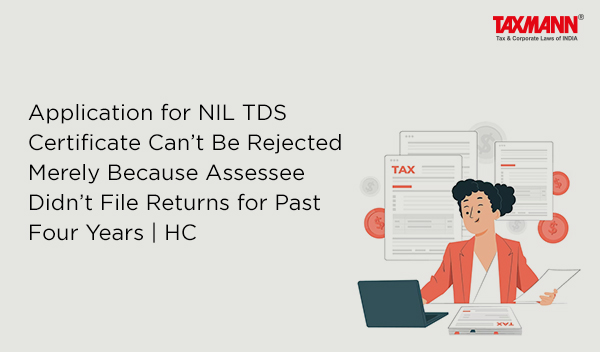Application for NIL TDS Certificate Can’t Be Rejected Merely Because Assessee Didn’t File Returns for Past Four Years | HC
- Blog|News|Income Tax|
- 2 Min Read
- By Taxmann
- |
- Last Updated on 18 November, 2023

Case Details: Bitkuber Investments Private Limited vs. DCIT - [2023] 156 taxmann.com 384 (Karnataka)
Judiciary and Counsel Details
-
- B.M. Shyam Prasad, J.
- T. Suryanarayana, Sr. Adv. Ms Tanmayee Rajkumar, Ms Manasa Ananthan & Ms Neha Rao, Adv. for the Petitioner.
- K.V. Aravind & Dilip M., Adv. for the Respondent.
Facts of the Case
Assessee filed an application under section 197 to issue a nil tax deduction certificate. Assessing Officer (AO) rejected application on grounds for four-fold reasons. One of the reasons was that assessee failed to file returns for the past four years.
Aggrieved by the rejection, the assessee filed a writ petition to the Karnataka High Court.
High Court Held
The High Court held that there were essentially three parts to the proceedings for issuance of a Certificate under Section 197(1). If the first two parts relate to the AO’s satisfaction that the total income justifies no deduction, or deduction at a lower rate, and the determination of the existing and estimated incomes. The third aspect related to the materials that the AO must consider to determine the existing and the estimated income to record satisfaction.
The details mentioned in Rule 28AA(2) of the IT Rules cannot be read to say that a Certificate under section 197 will be issued only when the returns for the previous four years are filed or that the tax must be paid for the previous year. The provisions of Rule 28AA(1) and 2(i) & 2(ii) of the IT Rules contemplate estimated liability and estimated income.
If the contention that only if the returns are filed for four previous years, or the payment of tax, is accepted as a condition for entertaining an application under Section 197(1), it would result in permitting classification and rendering redundant the concept of estimated liability and estimated income that are built into Rule 28AA.
Therefore, the provisions of Rule 28AA cannot be read as stipulating that an assessee, to be eligible to make an application under Section 197(1), should have necessarily filed returns for the previous four years and paid tax for the previous assessment year and that the failure in these regards would create an ineligibility to apply.
Accordingly, the assessee’s appeal was allowed.
Disclaimer: The content/information published on the website is only for general information of the user and shall not be construed as legal advice. While the Taxmann has exercised reasonable efforts to ensure the veracity of information/content published, Taxmann shall be under no liability in any manner whatsoever for incorrect information, if any.

Taxmann Publications has a dedicated in-house Research & Editorial Team. This team consists of a team of Chartered Accountants, Company Secretaries, and Lawyers. This team works under the guidance and supervision of editor-in-chief Mr Rakesh Bhargava.
The Research and Editorial Team is responsible for developing reliable and accurate content for the readers. The team follows the six-sigma approach to achieve the benchmark of zero error in its publications and research platforms. The team ensures that the following publication guidelines are thoroughly followed while developing the content:
- The statutory material is obtained only from the authorized and reliable sources
- All the latest developments in the judicial and legislative fields are covered
- Prepare the analytical write-ups on current, controversial, and important issues to help the readers to understand the concept and its implications
- Every content published by Taxmann is complete, accurate and lucid
- All evidence-based statements are supported with proper reference to Section, Circular No., Notification No. or citations
- The golden rules of grammar, style and consistency are thoroughly followed
- Font and size that’s easy to read and remain consistent across all imprint and digital publications are applied



 CA | CS | CMA
CA | CS | CMA
